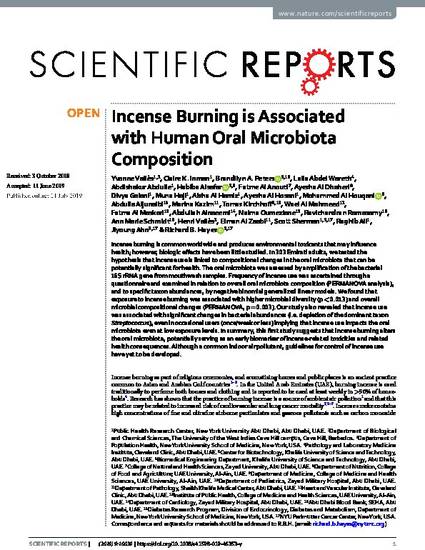
© 2019, The Author(s). Incense burning is common worldwide and produces environmental toxicants that may influence health; however, biologic effects have been little studied. In 303 Emirati adults, we tested the hypothesis that incense use is linked to compositional changes in the oral microbiota that can be potentially significant for health. The oral microbiota was assessed by amplification of the bacterial 16S rRNA gene from mouthwash samples. Frequency of incense use was ascertained through a questionnaire and examined in relation to overall oral microbiota composition (PERMANOVA analysis), and to specific taxon abundances, by negative binomial generalized linear models. We found that exposure to incense burning was associated with higher microbial diversity (p < 0.013) and overall microbial compositional changes (PERMANOVA, p = 0.003). Our study also revealed that incense use was associated with significant changes in bacterial abundances (i.e. depletion of the dominant taxon Streptococcus), even in occasional users (once/week or less) implying that incense use impacts the oral microbiota even at low exposure levels. In summary, this first study suggests that incense burning alters the oral microbiota, potentially serving as an early biomarker of incense-related toxicities and related health consequences. Although a common indoor air pollutant, guidelines for control of incense use have yet to be developed.
- fragrance,
- mouthwash,
- RNA 16S,
- adult,
- air pollutant,
- drug effect,
- female,
- genetics,
- human,
- indoor air pollution,
- male,
- microbiology,
- microflora,
- mouth,
- questionnaire,
- smoke,
- Adult,
- Air Pollutants,
- Air Pollution,
- Indoor,
- Female,
- Humans,
- Male,
- Microbiota,
- Mouth,
- Mouthwashes,
- Odorants,
- RNA,
- Ribosomal,
- 16S,
- Smoke,
- Surveys and Questionnaires
Available at: http://works.bepress.com/fatme-alanouti/24/
